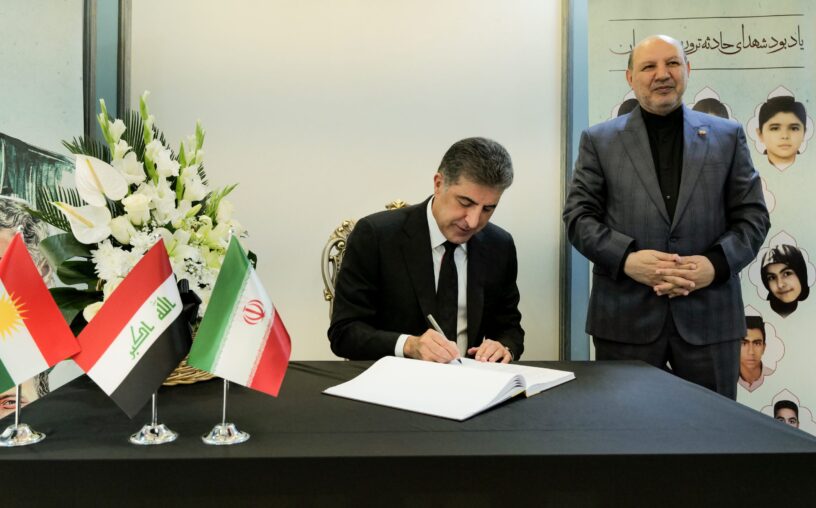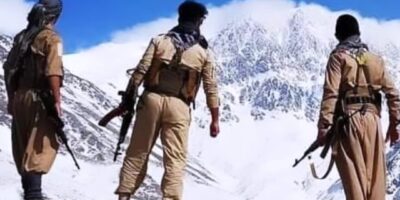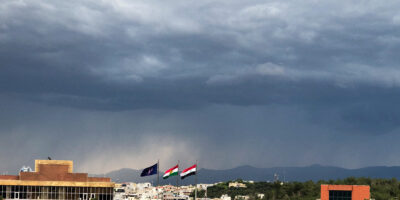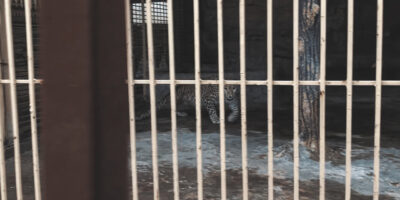For the best part of the last six decades, Kurds in northern Iraq’s Kurdistan Region have dealt directly or indirectly with the United States, Israel, and Iran, under both Mohammad Reza Shah and the current regime. In fact, it was Iranians who acted as a conduit for Kurdish guerrillas to begin relations with Israelis and Americans starting from around the mid-1960s.
The Kurds have had rocky relations with all the parties and at times survival instincts have forced them to play one against the other. Today, the Kurdistan Region is feeling the rising heat between Tehran and Washington over the war in Gaza.
Until earlier this month, Kurds thought they could be spared from the worst repercussions of the Israel-Hamas war, even as Lebanese Hezbollah and Houthis of Yemen entered the fray and despite around two dozen attacks on two military bases in Erbil province housing US-led coalition forces. But their hopes came crashing down after Iran, agitated by Israeli and American attacks, fired ballistic missiles across the sky of the Kurdistan Region, smashing into civilian infrastructure in its capital Erbil.
Kurds have celebrated the presence of the US-led coalition since that day in August 2014 when President Barack Obama decided to intervene to save Erbil from the Islamic State (ISIS) onslaught. But with tensions rising in the region, the presence of US forces has become a contentious issue in Iraq.
The US killed a senior militia commander aligned with Iran in Baghdad earlier this month in response to dozens of attacks on its forces by various militia groups in support of resistance in Gaza. Calls grew in Baghdad demanding the exit of US forces. Officials in the Kurdistan Region disagreed and believed that both Iraq proper and the Kurdistan Region still needed US-led coalition advisors.
Prime Minister Masrour Barzani met with Maj. Gen. Joel B. Vowell, commander of the Combined Joint Task Force – Operation Inherent Resolve in Syria and Iraq, on January 9. He highlighted the critical role the coalition played in helping Iraqi and Kurdish security forces fight ISIS and called for them to stay. The US is an important security ally for Erbil, not only in combatting ISIS, but also supporting and reforming the Peshmerga command and structure. The call for US forces to stay in Iraq was a slap in the face of Iran and its allies as Tehran has vehemently pushed for their exit, describing the Americans as a source of instability in Iraq and the wider region.
As anti-US sentiment swelled in Iraq, Israel intensified its attacks on Iranian assets in Syria.
In early December, two senior Islamic Revolutionary Guard Corps (IRGC) commanders were killed in suspected Israeli strikes in Damascus. This was a bad omen. Back in March 2022, when Israel killed two other IRGC commanders in Syria, the IRGC retaliated by firing missiles at Erbil, targeting the house of Kurdish oil tycoon Sheikh Baz Karim. The Kurds described the IRGC action at the time as a terrorist act. Later, an Iraqi parliament fact finding mission cleared Karim, stating that Iran’s claims were baseless and concluding that Karim’s residence was not an Israeli base.
This time, there were calls in Iran for the IRGC to retaliate against Israel, but the regime appeared to not want to escalate the situation further and promised to strike back in the future. Then Israel struck again in Damascus and killed the most senior operational commander of the IRGC’s external armed wing, the Quds force. Sayyed Razi Mousavi was responsible for logistical support for all members of the Resistance Axis and he had been a close confidant of General Qassem Soleimani before he was killed by the US in January 2020 in Baghdad. Even worse, Mousavi was killed as Iran was preparing to mark the fourth anniversary of Soleimani’s killing. The die was cast. Then with the ISIS attack in Kerman, it was clear that the IRGC would lash out.
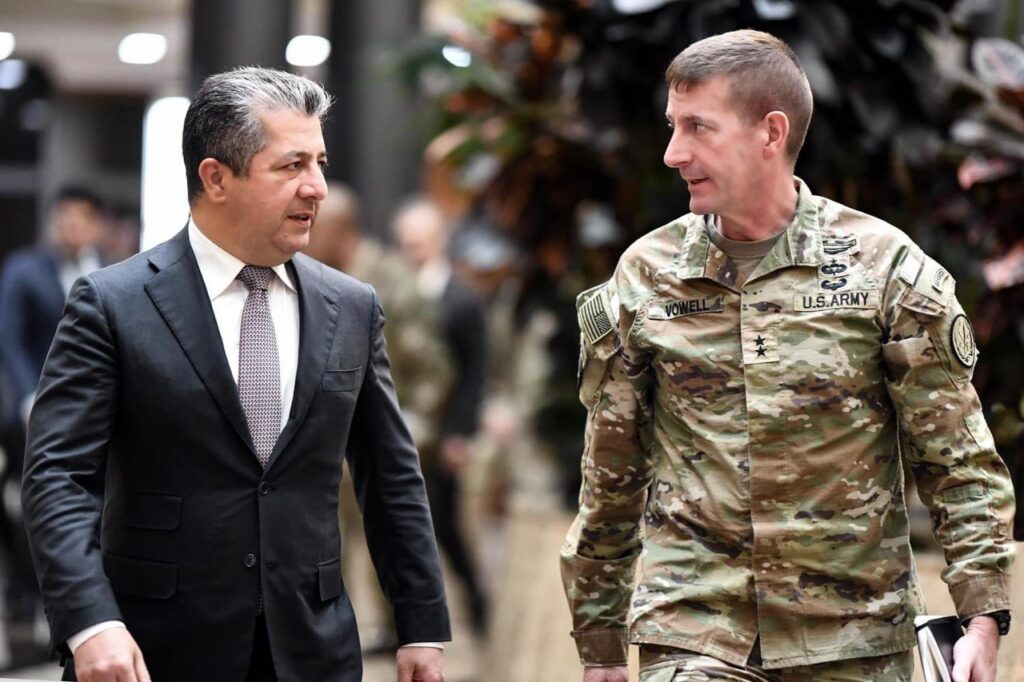
Kurdish officials tried in vain to appease the Iranians and were amongst the first to condemn the January 3 ISIS attack in Kerman that killed more than 90 people. President Nechirvan Barzani visited Iran’s representative office in Erbil on January 8 and met with Consul General Nasrollah Rashnudi to convey the condolences of the people of Kurdistan for the victims of the attack. President Barzani said that Kurdistan would not become a source of instability for its neighbours, especially the Islamic Republic. The head of the Kurdistan Region’s Department of Foreign Relations Safeen Dizayee also visited the consulate, not knowing that his extended family would become the focal point of Iran’s fury in the coming days.
Iraqi Prime Minister Mohammad Shia al-Sudani also tried to ameliorate the situation and told Reuters that Iraq needed to reorganise its relations with the US “so that it is not a target or justification for any party, internal or external, to tamper with stability in Iraq…” the agency quoted him saying on January 10.
Many IRGC activists and pro-regime elements complained about the lack of action from the Guards, despite numerous vows to inflict a “hard response” on the enemy. With a large portion of the population antagonised by the regime following the killing of protesters and the vicious crackdown that followed the September 2022 unrest, the regime needed to reassure its support base of its decisiveness and entice them to participate in the upcoming parliamentary election.
At around 23:00 on Monday, residents on the eastern outskirts of Erbil heard intense gunfire. It appeared that the gunfire was directed at a drone launched by the IRGC. Half an hour later, ballistic missiles rained down on Erbil and in particular the house of property magnate Peshraw Dizayee was targeted with at least three missiles. At least four civilians including a baby were killed.
Iran claimed that the residence of Dizayee, who was killed in the strike alongside his one year old baby girl, was an Israeli base. The Kurds rejected the claim and described the IRGC act as terrorism.
The Iraqi government took a strong position, filing a complaint with the United Nations Security Council. The international community including Pope Francis condemned Iran’s aggression. US ambassador to Iraq Lina Romanowski travelled to Erbil and showed “steadfast support” with the Kurds in the face of this “reckless” Iranian action.
Iran has doubled down on its threats. Top security chief Ali Akbar Ahmadian threatened Iraq and Kurdistan on Thursday with new strikes if any attacks by the “Zionist regime” originate from their territory.
The Kurds have realised that appeasing the IRGC bears no results and the Guards will strike at a whim. Kurdish officials came under heavy criticism from the wider Kurdish nation last year when, under IRGC threats, Iranian Kurdish opposition groups were disarmed and their camps were emptied.
Since firing missiles at Erbil, the IRGC has also attacked Syria and Pakistan, seemingly undeterred by the fact that in today’s charged environment, the smallest thing could spark a regional war with Iran at the heart of it.
IRGC aerospace commander Amir Ali Hajizadeh, responsible for the missile strikes on Erbil and the subsequent attacks on Syria and Pakistan, was asked on Thursday if the IRGC was worried about the enemy’s response. He replied, “Let them do any damned thing they want, because there is no problem and it is not important. We are prepared.” Hajizadeh said that the ultimate hard response is to force the Americans from the region.
An American exit from Iraq and Kurdistan would be catastrophic for the Kurds on many levels. It is likely that the much needed reform backed by the US and its allies within the fractured Peshmerga force would come to an end. The IRGC, which is in charge of the Iraq dossier on the Iranian side, would have a free reign to undermine Kurdistan’s security and fracture its political cohesion even more. The IRGC would try to extend the central government’s authority to all corners of the Kurdistan Region and wipe out any remnants of Iranian Kurdish opposition groups.
Since the attack on Erbil, the IRGC and its media arms have launched a massive campaign to portray Peshraw Dizayee as a major asset of Israel in the Kurdistan Region. They have also accused the Kurdistan Region of becoming a centre where plots against Iran and its slain nuclear scientists were concocted. For the time being, the Kurdistan Region has managed to galvanise the international community to condemn Iran’s reckless actions. But with the tension continuing to rise in the region, including in the Red Sea and with US bases in Syria and Iraq coming under 140 attacks since October 17, it is only a matter of time before Kurdish officials are forced to deal with another crisis created by Iran and the IRGC. They know they need to tread a fine line between the US and Iran to preserve what they have managed to salvage in this unpredictable region.

